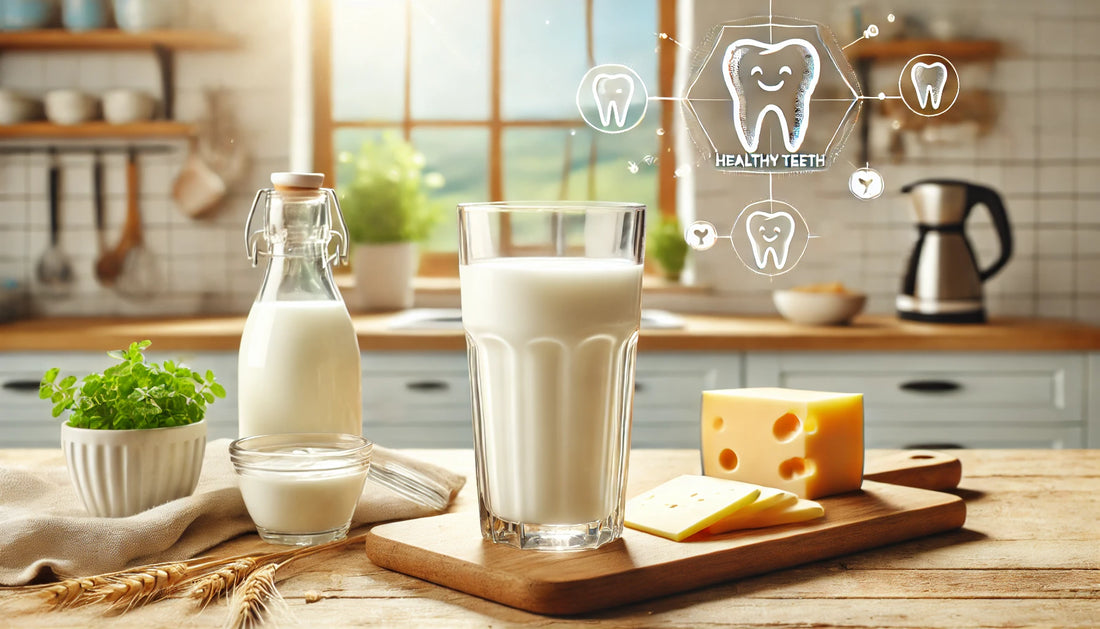Maintaining strong and healthy teeth is essential for overall well-being, and a balanced diet plays a crucial role in dental health. Among various dietary choices, milk stands out as a key contributor to dental health due to its rich nutrient profile. This article explores why milk is essential for strong and healthy teeth and how it can help prevent common dental problems.
Introduction
Good oral health is not just about brushing and flossing; it's also about what you eat and drink. Milk, a staple in many diets, is packed with nutrients that support dental health. From calcium to vitamin D, the components of milk work together to strengthen teeth and protect against decay. However, the source and quality of milk are just as important as its nutritional content.

The Nutritional Benefits of Milk for Dental Health
1. High Calcium Content
Calcium is one of the most important minerals for dental health. It helps build and maintain strong teeth and bones. Calcium makes up about 99% of the body's total calcium stores in bones and teeth, where it provides structure and strength.
- How Calcium Works: Calcium strengthens the enamel, the hard outer layer of the teeth, making it more resistant to decay. It also plays a crucial role in the development of strong teeth in children and the maintenance of adult teeth.
- Sources in Milk: An 8-ounce glass of milk provides about 300 milligrams of calcium, which is essential for maintaining healthy teeth.
2. Vitamin D
Vitamin D is another vital nutrient for dental health as it enhances calcium absorption in the body. Without adequate vitamin D, the body cannot effectively absorb calcium, regardless of how much you consume.
- How Vitamin D Works: It helps in the formation of tooth enamel and maintains the density of the jawbone, which supports the teeth. Adequate levels of vitamin D ensure that calcium is properly absorbed and utilized by the body.
- Sources in Milk: Many milk products are fortified with vitamin D, making it an excellent source of this crucial nutrient.
3. Phosphorus
Phosphorus works alongside calcium to build strong bones and teeth. It plays a significant role in the mineralization of teeth and bones, making them more robust and durable.
- How Phosphorus Works: It combines with calcium to form calcium phosphate, the primary component of tooth enamel. This combination helps to repair and rebuild tooth enamel, keeping teeth strong.
- Sources in Milk: Milk and dairy products are rich in phosphorus, contributing to the maintenance of healthy teeth.
4. Protein
Protein is essential for the overall health of the body, including dental health. It helps repair tissues and produces antibodies that fight infections in the mouth.
- How Protein Works: Proteins in milk, such as casein, form a protective film on the enamel surface, preventing the loss of calcium and phosphate when the teeth are exposed to acids from food and drinks.
- Sources in Milk: Milk provides high-quality protein, which supports the repair and maintenance of oral tissues.

Milk and Prevention of Dental Problems
1. Preventing Tooth Decay
Tooth decay occurs when acids produced by bacteria in the mouth dissolve the enamel. The calcium and phosphorus in milk help remineralize the enamel, making it more resistant to decay.
2. Reducing the Risk of Gum Disease
Gum disease is caused by the accumulation of plaque, a sticky film of bacteria on the teeth. The nutrients in milk, particularly calcium and vitamin D, help maintain healthy gums by reducing inflammation and promoting overall oral health.
3. Strengthening Enamel
Enamel erosion is a common dental problem caused by acidic foods and drinks. The high calcium content in milk helps rebuild and strengthen enamel, protecting teeth from erosion.
The Importance of Sourcing Good Milk
The quality and source of your milk can significantly impact its nutritional benefits. Here’s why choosing high-quality, locally sourced, or organic milk is important:
1. Fewer Additives and Preservatives
Organic and locally sourced milk typically contains fewer additives and preservatives compared to conventional milk. This means you’re getting a more natural product that retains its full nutritional value.
2. Higher Nutrient Content
Studies have shown that organic milk can contain higher levels of certain nutrients, including omega-3 fatty acids and antioxidants, compared to conventional milk. These additional nutrients can further support overall health and dental health.
3. Ethical and Environmental Considerations
Sourcing milk from local farmers or choosing organic options supports ethical farming practices and reduces the environmental impact associated with large-scale dairy farming. This ensures that the milk you consume is not only good for your health but also for the planet.
How to Incorporate Milk into Your Diet
1. Drink Milk Regularly
Include a glass of milk with your meals or as a snack to ensure you get a regular supply of essential nutrients.
2. Use Milk in Cooking
Incorporate milk into your cooking by using it in soups, sauces, smoothies, and baked goods to boost your nutrient intake.
3. Choose Dairy Products
Include other dairy products like cheese and yogurt in your diet. These products also provide calcium, phosphorus, and protein, contributing to dental health.
Conclusion
Milk is a powerful ally in maintaining strong and healthy teeth. Its rich nutrient profile, including calcium, vitamin D, phosphorus, and protein, works together to support dental health and prevent common dental problems. Choosing high-quality, locally sourced, or organic milk can enhance these benefits. Incorporating milk and dairy products into your diet can help ensure that your teeth remain strong, healthy, and free from decay. For optimal dental health, combine a balanced diet with regular brushing, flossing, and dental check-ups.
For more tips on maintaining strong and healthy teeth, visit ToothPow Dental Care and explore our range of dental products designed to support your oral health.

